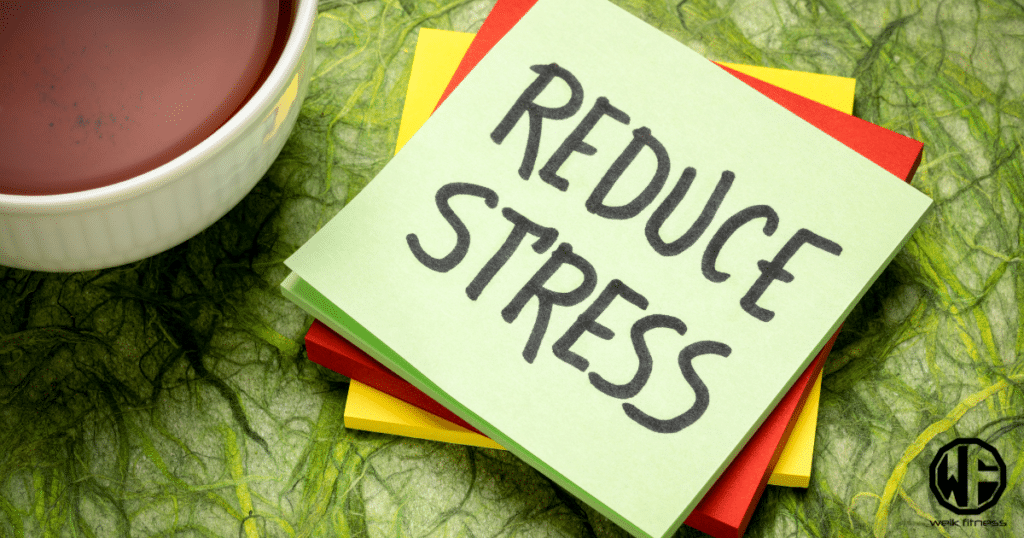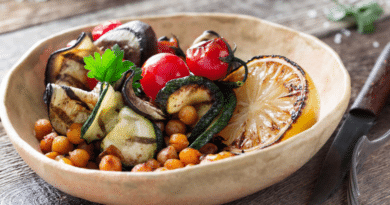10 Stress-Reducing Foods You Need in Your Busy Life
Feeling overwhelmed? You’re not imagining it. According to the American Psychological Association, around 75% of adults in the U.S. reported experiencing symptoms of stress in the last month. That constant pressure from work, family, and finances can leave you feeling drained. That’s where stress-reducing foods come in.
As a certified sports nutritionist and personal trainer, I’ve seen firsthand how chronic stress impacts the body. It’s not just in your head; it’s a physical response. Your body releases hormones like cortisol and adrenaline, putting you in a constant state of high alert.
The good news is that you have a powerful tool to fight back: your diet. By choosing the right stress-reducing foods, you can help your body better manage these hormonal responses. This guide will show you exactly which foods to add to your plate to help calm your system and regain control.

Food can either fuel your stress or help you fight it. It all depends on what you choose to eat when you’re feeling the pressure. For more on how supplements can also play a role, consider looking into the benefits of things like Bergamot Supplements.
First, let’s break down what stress actually does to your body.
Disclaimer: This article is for informational purposes only and is not meant to treat or diagnose any condition. It is recommended that you speak with your doctor if you feel you suffer from chronic stress to find out what options you have.
Table of contents
Key Takeaways
- Certain foods contain key nutrients like B vitamins, magnesium, and omega-3 fatty acids that help regulate stress hormones like cortisol.
- Fatty fish, nuts, seeds, dark chocolate, and leafy greens are powerful stress-reducing foods.
- The gut-brain axis is a critical connection; foods with probiotics like yogurt can improve mood by supporting gut health.
- Limiting processed foods, refined sugars, and excessive caffeine can prevent cortisol spikes and help manage stress more effectively.

Stress-Reducing Foods: Should You Be Stressed About It?
Your body is hardwired to react to stress. In some cases, that’s a good thing, like when you need a burst of focus for a big presentation. But when stress becomes chronic, it can lead to serious health issues.
Long-term, negative stress can contribute to:
- Anxiety
- Depression
- Headaches and muscle tension
- Elevated blood pressure and chest pain
- Upset stomach and digestion issues
- Sleeping disorders and exhaustion
- Weakened immune system
When you’re stressed, your adrenal glands release hormones like adrenaline and cortisol. These hormones raise your alertness, increase your heart rate, and tense your muscles. While helpful in short bursts, constant exposure can be damaging.
That’s where stress-reducing foods become so important. Making smart nutritional choices helps you manage these hormonal responses in a healthy way, steering you away from unhealthy coping mechanisms like excessive alcohol or binge eating on sugary, processed foods.
10 Stress-Reducing Foods to Have in Your Diet

A healthy diet can be a powerful tool for stress relief. Below are some of the best stress-reducing foods you can add to your diet today to help manage your stress levels effectively.
1. Nuts
Stress can deplete your body’s B-vitamin stores, which are essential for a healthy nervous system. Snacking on a handful of nuts is an excellent way to replenish them and you should add these stress-reducing foods to your grocery list.
These vitamins are crucial for producing neurotransmitters that regulate mood. Nuts are also packed with potassium, which helps lower blood pressure and reduces the strain on your heart during stressful moments.
Pro-Tip: Opt for walnuts, which are a fantastic source of alpha-linolenic acid (ALA), a plant-based omega-3 fatty acid known for protecting the brain against the negative effects of stress.
2. Fatty Fish
Fatty fish like salmon, mackerel, herring, and sardines are packed with omega-3 fatty acids, particularly EPA and DHA. These fats are vital for cognitive function and mental health.
Research consistently shows a strong link between omega-3 consumption and reduced anxiety. According to a 2011 study on medical students, those who took omega-3 supplements saw a 20% reduction in anxiety symptoms. These fatty acids help regulate neurotransmitters like dopamine and reduce inflammation, both of which can be thrown off by stress.
The American Heart Association recommends eating at least two 3.5-ounce servings of non-fried fish per week to reap these benefits.
3. Eggs
Often called nature’s multivitamin, whole eggs are a powerhouse of vitamins, minerals, and amino acids that support a healthy stress response.
Eggs are one of the best dietary sources of choline, a nutrient crucial for brain health. Choline helps produce acetylcholine, a neurotransmitter that plays a role in mood regulation and stress reduction. Low levels of choline have been linked to higher anxiety.
4. Dark Chocolate
Good news for chocolate lovers. It’s one of the stress-reducing foods! Enjoying dark chocolate in moderation can help lower stress hormones.
- Chemical Impact: Dark chocolate is rich in flavonoids, which are antioxidants that have been shown to reduce cortisol levels.
- Emotional Impact: The simple pleasure of eating chocolate can be a mood booster in itself.

For the best results, choose dark chocolate that is 70% cocoa or higher. This ensures you get a potent dose of flavonoids without the excess sugar found in milk chocolate, which can actually spike cortisol.
5. Spinach
This leafy green is one of the best stress-reducing foods you can eat. Spinach is loaded with magnesium, a mineral that plays a vital role in over 300 biochemical reactions in the body, including the stress response.
Magnesium helps regulate cortisol levels and blood pressure. When you’re stressed, your body’s magnesium levels can drop, making you more susceptible to the physical effects of stress. A single cup of cooked spinach provides a significant portion of the recommended daily intake of 310-420 mg for most adults.
6. Oatmeal
When stress hits, it’s common to crave sugary, processed carbs. However, these foods cause a rapid spike and crash in blood sugar, which can make your mood worse.
A much better choice is a complex carbohydrate like oatmeal. Complex carbs are digested more slowly, providing a steady supply of energy and helping to increase levels of the mood-boosting neurotransmitter serotonin in your brain.
Related Article: Protein Brownie Overnight Oatmeal Recipe
Choose plain, unsweetened oats and add your own healthy toppings like nuts, berries, or a drizzle of honey to control the sugar content.
7. Chamomile Tea
It’s not just food that can help. Certain beverages, like chamomile tea, have been used for centuries to promote relaxation and reduce stress.
The calming effects of chamomile are largely due to an antioxidant called apigenin. Apigenin binds to specific receptors in the brain that help decrease anxiety and initiate sleep. Studies have shown that chamomile extract can significantly reduce symptoms of generalized anxiety disorder.
8. Avocados
Avocados are a fantastic source of stress-busting nutrients and should be used as one of your stress-reducing foods. They are rich in magnesium, B vitamins, and heart-healthy monounsaturated fats. The high potassium content in avocados also helps to keep blood pressure under control.
For a healthy cooking alternative, you can also incorporate avocado oil into your diet. Its high smoke point makes it great for various cooking methods.
9. Yogurt
There’s a powerful connection between your gut and your brain, often called the gut-brain axis. An unhealthy gut can contribute to stress and anxiety. Yogurt and other fermented foods like kefir and kimchi contain beneficial bacteria, such as Lactobacillus and Bifidobacterium, that support a healthy gut microbiome.
These probiotics can help reduce inflammation and increase the production of mood-boosting neurotransmitters like serotonin. Studies have shown that regular consumption of probiotics can lead to lower levels of cortisol and reduced feelings of stress and anxiety.
Insider Tip: Choose plain Greek yogurt, which is higher in protein and has no added sugar. You can sweeten it naturally with fruit or a small amount of honey.
10. Turmeric
Turmeric is a vibrant yellow spice celebrated for its powerful anti-inflammatory properties, thanks to its active compound, curcumin. This is one of the great stress-reducing foods.
Chronic inflammation is closely linked to stress and anxiety. Curcumin helps combat this inflammation and may also boost levels of serotonin and dopamine, the “feel-good” hormones. To maximize its benefits, it’s crucial to consume turmeric with a pinch of black pepper. The piperine in black pepper enhances curcumin absorption by up to 2,000%.
Even if you don’t regularly cook with it, turmeric supplements are an excellent option to get a concentrated dose of its stress-reducing benefits.
Stress-Reducing Foods FAQs
What foods can make stress and anxiety worse?
Highly processed foods, sugary snacks and drinks, and excessive caffeine can all contribute to spikes in your stress hormone, cortisol. These foods can cause your blood sugar to rise and fall rapidly, leading to mood swings and increased feelings of anxiety.
How quickly can changing my diet help with stress?
While some effects can be immediate, such as the calming feeling after a cup of chamomile tea, the most significant benefits come from consistent, long-term dietary changes with stress-reducing foods. Building up levels of key nutrients like omega-3s and magnesium takes time. Most people report feeling noticeable improvements within a few weeks of consistently eating more stress-reducing foods.
Are there any supplements that help with stress?
Yes, several supplements can help. Magnesium is well-known for its relaxing properties. L-theanine, an amino acid found in green tea, can promote a sense of calm without drowsiness. Ashwagandha, an adaptogenic herb, has also been shown to help the body manage stress more effectively. Always talk to your doctor before starting any new supplement regimen.


*Disclosure: This article may contain affiliate links or ads, which means we earn a small commission at no extra cost to you if you make a purchase through these links. These commissions help support the operation and maintenance of our website, allowing us to continue producing free valuable content. Your support is genuinely appreciated, whether you choose to use our links or not. Thank you for being a part of our community and enjoying our content.
PLEASE CONSIDER SHARING THIS ON YOUR SOCIAL MEDIA TO HELP OTHERS LEARN MORE ABOUT THIS TOPIC.





